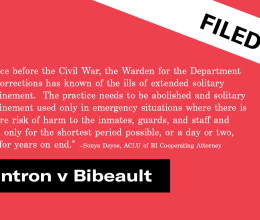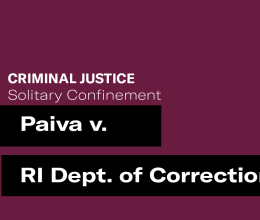As questions swirl around the suicide of a man being held in solitary confinement at the ACI last week, the American Civil Liberties Union of Rhode Island today filed a “friend of the court” brief supporting an ACI inmate’s constitutional challenge to his confinement in solitary for over a year as a violation of the constitutional ban on cruel and unusual punishment.
The brief was also filed on behalf of Aaron Regunberg, a former state representative who chaired a legislative commission on solitary confinement in 2017, and Rep. Leonela Felix, who is sponsoring legislation to severely restrict the DOC’s use of this questionable practice.
The brief was filed in the U.S. Court of Appeals for the First Circuit in support of Jerry Cintron, whose lawsuit alleges that while suffering from substance use disorder, he was given no treatment despite his requests for it. Instead, he was kept in disciplinary segregation for over one year where he spent at least 23 hours a day in an eight-by-ten foot cell, was given a maximum of one 10-minute phone call each month, and was provided no access to programming.
The brief notes that this period of prolonged isolation “caused Cintron to suffer mental illness, including anxiety and depression, to engage in self-harm, including pulling out his hair and badly injuring his hand by bashing it against the wall, and weight loss of almost 70 pounds.” He was sentenced to multiple consecutive terms of solitary confinement for the same incident: admitting, after being found unconscious in his cell and taken to the hospital where he almost died, that he had taken narcotics.
In urging the appeals court to find that prison officials violated Cintron’s well-established right to be free from cruel and unusual punishment and they should therefore be held liable for that violation, the ACLU’s brief chronicles the use of solitary confinement in Rhode Island over the past two centuries, pointing out that it was abandoned as early as 1840 in recognition of its deeply deleterious effects on the mental and physical health of inmates. Noting that “[h]istory often provides us with important lessons if we are willing to learn them,” the amicus brief states:
A cursory review of the history pertaining to the use of solitary confinement in Rhode Island shows that Rhode Island abandoned the use of solitary confinement from 1840 until 1960 because it determined that its use caused inmates to become deranged or insane and could lead to inmate suicide. By 1844, its use for more than a short period was deemed to be cruel and unusual punishment. After restoring solitary for a relatively brief period in the 1960s, the State agreed to limit its use by court order in the late 1960s. Prison officials have repeatedly ignored their obligations to limit its duration, instead permitting inmates like Cintron to be isolated for prolonged periods of years, this despite their participation in a Legislative Commission that heard testimony about solitary confinement’s ills, and despite numerous other decisions allowing inmates to bring these claims based on injury they suffered after being kept in solitary confinement for long periods.
Indeed, the brief notes that a report from state prison inspectors as far back as 1843 raised concerns about “a number of cases of insanity among the prisoners” and determined “strict solitary confinement is a mistaken system of punishment experience has clearly proved.” The ACLU brief concludes by stating that prison officials kept Cintron “in near total isolation for more than a year, despite the pronounced and obvious deterioration in his health. This is not a reasonable action for any correctional officer,” and that on the facts of this case, they “should not be provided a shield for their actions” by being granted immunity from liability.
The brief was filed by ACLU of RI cooperating attorneys Sonja Deyoe and Lynette Labinger. Cintron is being directly represented in the appeal by attorneys for the R.I. Center for Justice and the MacArthur Justice Center. A copy of the ACLU’s brief can be found here, and brief quotes from participants in the case are below.
QUOTES FROM THE ACLU-RI COOPERATING ATTORNEYS AND AMICI CURIAE
Sonja Deyoe: “Since before the Civil War, the Warden for the Department of Corrections has known of the ills of extended solitary confinement. The practice needs to be abolished and used only in emergency situations where there is severe risk of harm to the inmates, guards, and staff and then only for the shortest period possible, or a day or two, not for years on end.”
Rep. Leonela Felix (District 61): “Holding DOC accountable for the tragic deaths of incarcerated Rhode Islanders in their care and custody is crucial. Doing so can be achieved through various avenues from legislative reform efforts to legal challenges. By joining the amicus brief, we unite in demanding justice and ensuring that those responsible are held accountable for their practices that have caused so much harm to our communities.”
Lynette Labinger: “The history of solitary confinement in Rhode Island, the findings of a 2017 legislative commission investigating its use at the ACI, various court decisions over the years, and Mr. Citron’s obvious mental distress all put prison officials on clear notice that his lengthy confinement in solitary constituted cruel and unusual punishment. We are hopeful that the court will allow his case to proceed and to vindicate his Eighth Amendment rights.”
Aaron Regunberg: “We first started pushing for legislation to limit long-term solitary confinement in 2016. Seven years later, and Rhode Islanders are still losing their lives to this torture. It’s clear the courts need to step in to stop these barbaric measures, and I’m proud to support this critical litigation.”






